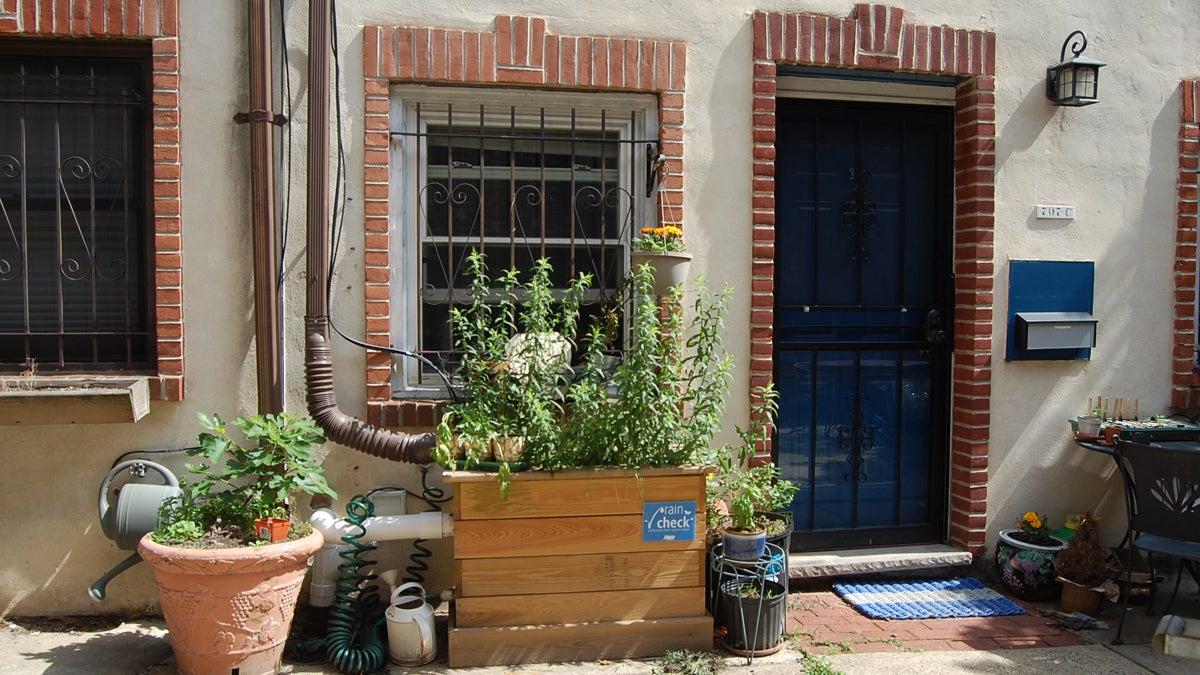‘Green City’ project keeps Philadelphia rainwater run-off in check
Listen
A RainCheck downspout planter in action
Our weeks and weeks of spring showers may be over, but Philadelphia Water is always thinking about rain. Its massive, 25-year project, “Green City, Clean Waters,” focuses quite a lot on storm water and how to manage it.
“Every time it rains, we end up with diluted sewage in our rivers and streams,” notes Maggie Dunn, a community planner for Philadelphia Water. “When it rains, the treatment plants can’t keep up with all the water, so it’s designed to overflow into our rivers.”
Since 2011, it’s been working to reduce Philadelphia’s concrete jungle and increase its permeable surface area. “If we plant more plants and trees throughout the city, that will restore some of the natural water cycle, and soak up some of that water when it rains,” explains Dunn.
Much of the Green City, Clean Waters plan involves a long to-do list of infrastructure projects for the water and streets departments. They’ve been outfitting whole blocks with porous pavement, carving out long tree trenches at street corners, and adding green spaces to playgrounds and schoolyards to slow the flow of rain water. But it’s not just streets and playgrounds that can’t soak up the rainwater. Roofs, courtyards, backyard patios … residential properties add a lot of impervious surface to the cityscape.
So Philadelphia Water has a way for residents to participate. The Rain Check program helps residents pay for projects that reduce storm water run-off from their properties.
As the owner of a classic Philadelphia trinity house, surrounded by concrete, I wanted to learn more about Rain Check.
Managed by the Pennsylvania Horticultural Society, it installs storm water management tools in homes in the city. A variety of options can accommodate different circumstances in neighborhoods and housing types. “We have the rain barrels and the downspout planter box. It’s a wooden planter box that manages roof runoff. We’ll connect the planter to the downspout from the home so it’s managing storm water runoff coming off the roof,” says Program Manager Zachary Popkin.
For properties with more space, there are rain gardens — long basins with tree, shrub and other plantings that can hold a lot of rain runoff, and two types of masonry projects: one to remove concrete and another to install paving that is water permeable.
At my house, the Rain Check staff recommended a downspout planter. I found the opportunity to both manage storm water runoff and add some greenery around my house especially appealing, so I signed up.
Mike Wilcox, chair of the Hunting Park Community Garden, works as an installer for the Rain Check program. On a warm sunny day last summer, he built my downspout planter and filled it with gravel, soil and plants. “There’s some holes in this PVC pipe that allow the water to pass through and the stones help it to keep it clear so that the water can easily pass through without being clogged with soil,” he explained.
Philadelphia Water’s goal is to divert 85 percent or nearly 8 billion gallons of storm water from the sewer system each year. So how much can one of the Rain Check options contribute to the effort?
“The rain barrels that we install are 55 gallons,” notes the Horticultural Society’s Popkin. “It is certainly an incremental impact in the grand scheme of things, but we’ve installed several thousand rain barrels through the history of this program. So if you take 55 gallons, multiply it by several thousand rain barrels, now we’re talking about tens of thousands of gallons of storm water that we’re managing every single time it rains.”
And the numbers keep growing. “This past year we’ve installed about 750 rainbarrels,” says Popkin. “We typically do about 60 to 75 or 80 downspout planters each year and in the past year in terms of depaving, rain gardens and permeable paving, we’ve done about 40-50 in the past year. It’s been a strong year.”
What’s more, in addition to offering rain barrels for free, Philadelphia Water will cover most of the cost of the other options, like my downspout planter.
Zachary Popkin points out another of Rain Check’s benefits. “This is something we say at PHS. We try to build beauty every daym — hashtag build beauty… to beautify Philadelphia neighborhoods.”
WHYY is your source for fact-based, in-depth journalism and information. As a nonprofit organization, we rely on financial support from readers like you. Please give today.




